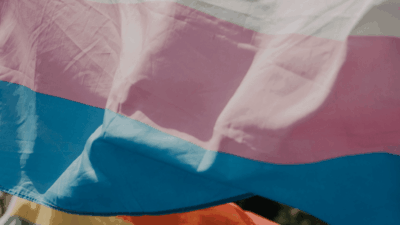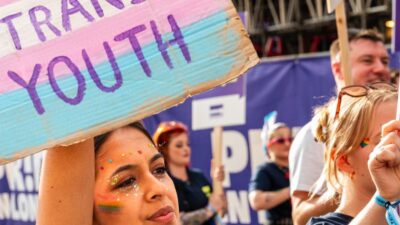There's 'awareness' of trans people – but too often it's the wrong kind
This piece was originally published in The Big Issue.
There's 'awareness' of trans people – but too often it's the wrong kind
Ayla Holdom, interim chair of the board of trustees at Stonewall, writes about the need for compassion for transgender people beyond Trans Awareness Week.
Every day is a Trans Awareness Day when you’re openly trans. Every interaction, every sideways glance, every moment of choosing authenticity over safety is an act of awareness.
So when Trans Awareness Week comes around, I sometimes feel conflicted. On one hand, it’s a welcome opportunity to talk openly about our lives. On the other, I can’t help thinking that there’s already too much awareness – just of the wrong kind.
We are, perhaps, one of the most discussed groups in Britain right now. Politicians, commentators, and campaigners seem endlessly fascinated by us. Yet so few of those conversations involve trans people themselves. The result is a strange kind of awareness: a noisy, abstract debate that bears little resemblance to our actual lives.
The truth is simple: being trans is just one facet of my life, my family and my humanity. I lead an everyday life like any other.
But that humanity is easily lost in the noise. In the mid-2010s, I thought we might be turning a corner – that trans people could live openly, safely and with dignity. Yet here we are, in 2025, facing new attempts to roll back equality, from the EHRC’s draft guidance following the April Supreme Court ruling to the political rhetoric that casts our existence as up for debate.
When I think about what I want people – especially policymakers – to understand, it’s this: trans people are not a political challenge to be solved. We are your colleagues, your constituents, your neighbours. We are parents walking our kids to school, partners planning the weekend, people trying to get on with life.
That’s what I see every day in my role as chair of the board at Stonewall. We work across sectors to help organisations do better – not by shouting, but by engaging, educating, and collaborating. Stonewall has always believed that progress happens when we meet people where they are, while holding them accountable to go further.
And yet, too often, trans people are used as political currency – a way to score points or provoke division. We’re not the first group to experience that, and we won’t be the last. But the cost is real: every headline that questions our legitimacy makes life harder for trans people just trying to exist.
So I am proud that Stonewall are continuing to bring people together, with our Brave Conversations series. It is only by having those – sometimes difficult – conversations, with others whose views we may find challenging, or different to our own, that we will find common ground and overcome some of the barriers to progress that still affect our communities.
So, what can you do if you want to be an ally? Start small. Don’t wait for the perfect words – perfection is the enemy of progress. Speak up when you can, even gently. Challenge misinformation when you hear it. Show kindness and curiosity. Each of those small moments builds the world we want to live in.
For me, that world already exists in miniature. I live in rural Devon with my wife and our five-year-old daughter. We’re a same-sex couple, and I’m trans. Our daughter knows my story; it’s simply part of who we are as a family. Our daily life – the school run, dinner with friends, planning holidays – looks just like everyone else’s.
That reality is invisible in most public debates about trans lives, but it’s the truth for so many of us. The real “trans experience” is not defined by conflict – it’s defined by love, belonging, and the simple desire to live freely.
Trans Awareness Week is a reminder that equality isn’t just a legal or political goal. It’s a human one. And it’s built, day by day, in the small moments of understanding we create together.
Because awareness, by itself, isn’t enough. What matters is empathy – and action.
Visit our Trans Hub to learn more about trans and non-binary inclusion



